定语从句语法规则
初中英语语法——定语从句用法总结归纳
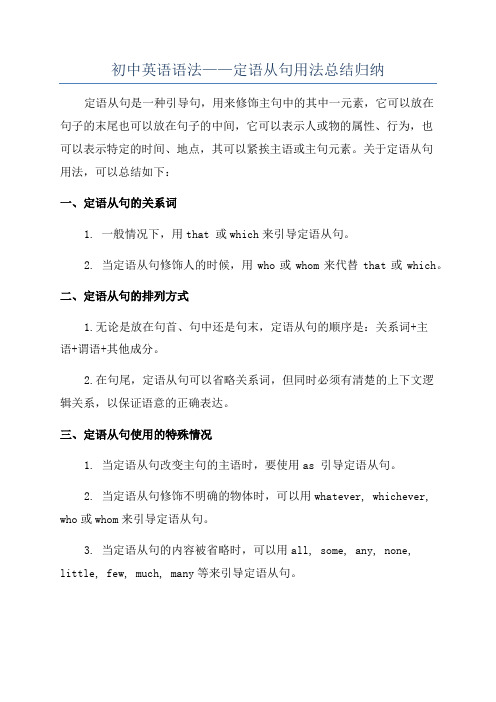
初中英语语法——定语从句用法总结归纳定语从句是一种引导句,用来修饰主句中的其中一元素,它可以放在
句子的末尾也可以放在句子的中间,它可以表示人或物的属性、行为,也
可以表示特定的时间、地点,其可以紧挨主语或主句元素。
关于定语从句
用法,可以总结如下:
一、定语从句的关系词
1. 一般情况下,用that 或which来引导定语从句。
2. 当定语从句修饰人的时候,用who或whom来代替that或which。
二、定语从句的排列方式
1.无论是放在句首、句中还是句末,定语从句的顺序是:关系词+主
语+谓语+其他成分。
2.在句尾,定语从句可以省略关系词,但同时必须有清楚的上下文逻
辑关系,以保证语意的正确表达。
三、定语从句使用的特殊情况
1. 当定语从句改变主句的主语时,要使用as 引导定语从句。
2. 当定语从句修饰不明确的物体时,可以用whatever, whichever, who或whom来引导定语从句。
3. 当定语从句的内容被省略时,可以用all, some, any, none, little, few, much, many等来引导定语从句。
英语定语从句的语法规则
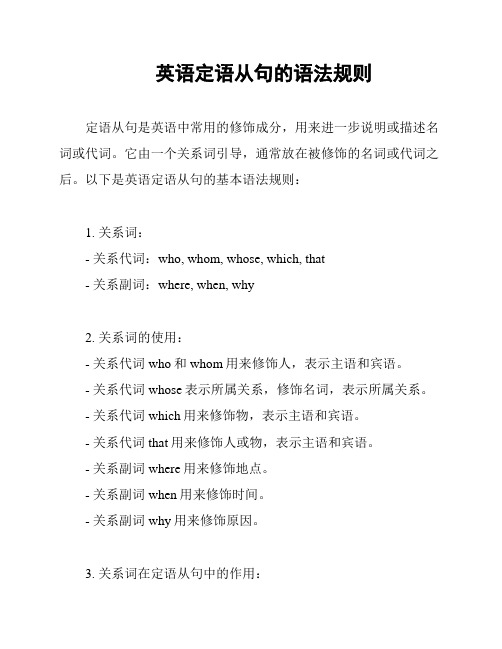
英语定语从句的语法规则
定语从句是英语中常用的修饰成分,用来进一步说明或描述名词或代词。
它由一个关系词引导,通常放在被修饰的名词或代词之后。
以下是英语定语从句的基本语法规则:
1. 关系词:
- 关系代词:who, whom, whose, which, that
- 关系副词:where, when, why
2. 关系词的使用:
- 关系代词who和whom用来修饰人,表示主语和宾语。
- 关系代词whose表示所属关系,修饰名词,表示所属关系。
- 关系代词which用来修饰物,表示主语和宾语。
- 关系代词that用来修饰人或物,表示主语和宾语。
- 关系副词where用来修饰地点。
- 关系副词when用来修饰时间。
- 关系副词why用来修饰原因。
3. 关系词在定语从句中的作用:
- 关系词引导的从句在句子中充当定语,修饰先行词。
- 关系词在定语从句中可以作为主语、宾语、表语或定语。
4. 定语从句的位置:
- 定语从句通常紧跟在被修饰的名词或代词之后。
5. 关系词的省略:
- 当关系词在定语从句中作宾语且被省略时,定语从句中的动词要用关系代词所引导的从句中的主语作宾语。
- 当关系词在定语从句中作主语且被省略时,定语从句中的谓语动词要用关系代词所引导的从句中的主语作主语。
需要注意的是,定语从句的使用要考虑先行词的性质和所要表达的具体含义。
有时候也需借助上下文来判断关系词的选择。
以上是英语定语从句的基本语法规则,希望对您有所帮助。
(完整版)定语从句语法详解

定语从句语法专题(Attributive Clauses)教案一. 定语从句的概述:1.定语从句:在复合句中,修饰某一名词或代词的从句叫定语从句。
在句中做定语,被修饰的名词或代词,叫做先行词。
从句通常放在先行词之后,由关系词(关系代词或关系副词)引导。
其作用是作定语修饰主句的某个名词性成分,相当于形容词,所以又称为形容词性从句,一般紧跟在它所修饰的先行词后面。
eg She is the girl(who got the first prize.)girl先行词who充当从句主语, 从句做定语修饰girlThis is the boy who broke the window.这就是打破窗子的孩子。
the boy是先行词, who broke the window是限制性定语从句, 明确指出theboy是打破窗子的那个孩子,who 在从句中充当主语That is the house where he lived ten years ago.He is the man who/that lives next door.He is the man who I want to see.先行词关系词定语从句复合句: 是由一个主句和一个或一个以上的从句构成的句子, 复合句中的主句和从句都具有完整的的主语和谓语, 主句是复合句的主体, 可以独立存在, 从句需要有一个连词引导, 是修饰说明主句的, 不能独立存在, 根据在句中的不同作用, 从句可以分为三类: 定语从句, 名词性从句, 状语从句。
二. 引导定语从句的关系词有两大类:1.关系词:引导定语从句的关联词称为关系词,关系词有关系代词和关系副词。
关系代词: that, who, whom, whose, which, as(主, 宾, 定)关系副词: when, where, why.(状语)2.关系词的作用:(1)引导定语从句, 在先行词和定语从句之间起连接作用;(2)代替先行词在句中充当成分。
定语从句语法规则
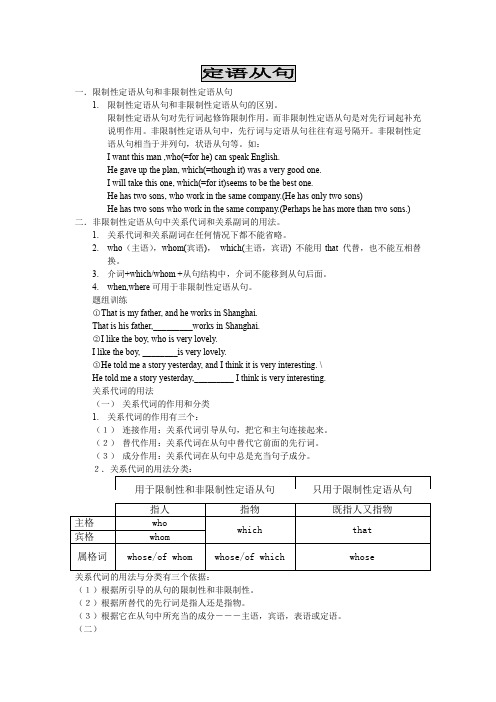
一.限制性定语从句和非限制性定语从句1.限制性定语从句和非限制性定语从句的区别。
限制性定语从句对先行词起修饰限制作用。
而非限制性定语从句是对先行词起补充说明作用。
非限制性定语从句中,先行词与定语从句往往有逗号隔开。
非限制性定语从句相当于并列句,状语从句等。
如:I want this man ,who(=for he) can speak English.He gave up the plan, which(=though it) was a very good one.I will take this one, which(=for it)seems to be the best one.He has two sons, who work in the same company.(He has only two sons)He has two sons who work in the same company.(Perhaps he has more than two sons.) 二.非限制性定语从句中关系代词和关系副词的用法。
1.关系代词和关系副词在任何情况下都不能省略。
2.who(主语),whom(宾语),which(主语,宾语) 不能用that 代替,也不能互相替换。
3.介词+which/whom +从句结构中,介词不能移到从句后面。
4.when,where可用于非限制性定语从句。
题组训练○1That is my father, and he works in Shanghai.That is his father,_________works in Shanghai.○2I like the boy, who is very lovely.I like the boy, ________is very lovely.○3He told me a story yesterday, and I think it is very interesting. \He told me a story yesterday,_________ I think is very interesting.关系代词的用法(一)关系代词的作用和分类1.关系代词的作用有三个:(1)连接作用:关系代词引导从句,把它和主句连接起来。
定语从句的语法结构与引导词
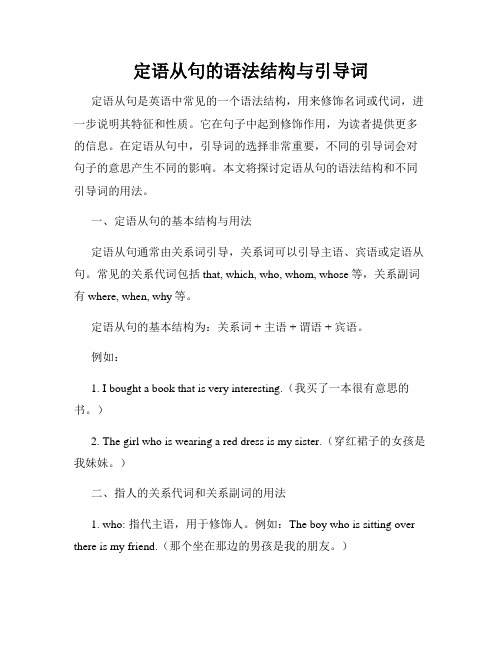
定语从句的语法结构与引导词定语从句是英语中常见的一个语法结构,用来修饰名词或代词,进一步说明其特征和性质。
它在句子中起到修饰作用,为读者提供更多的信息。
在定语从句中,引导词的选择非常重要,不同的引导词会对句子的意思产生不同的影响。
本文将探讨定语从句的语法结构和不同引导词的用法。
一、定语从句的基本结构与用法定语从句通常由关系词引导,关系词可以引导主语、宾语或定语从句。
常见的关系代词包括that, which, who, whom, whose等,关系副词有where, when, why等。
定语从句的基本结构为:关系词 + 主语 + 谓语 + 宾语。
例如:1. I bought a book that is very interesting.(我买了一本很有意思的书。
)2. The girl who is wearing a red dress is my sister.(穿红裙子的女孩是我妹妹。
)二、指人的关系代词和关系副词的用法1. who: 指代主语,用于修饰人。
例如:The boy who is sitting over there is my friend.(那个坐在那边的男孩是我的朋友。
)2. whom: 指代宾语,用于修饰人。
例如:The woman whom he met yesterday is a famous actress.(他昨天见到的那个女人是一位著名的演员。
)3. whose: 用于修饰人或物,表示所属关系。
例如:The man whose car was stolen is very upset.(那个车被偷的人非常难过。
)4. where: 用于修饰地点。
例如:This is the school where I study.(这是我学习的学校。
)5. when: 用于修饰时间。
例如:That was the day when we met for the first time.(那是我们第一次见面的日子。
定语从句语法总结
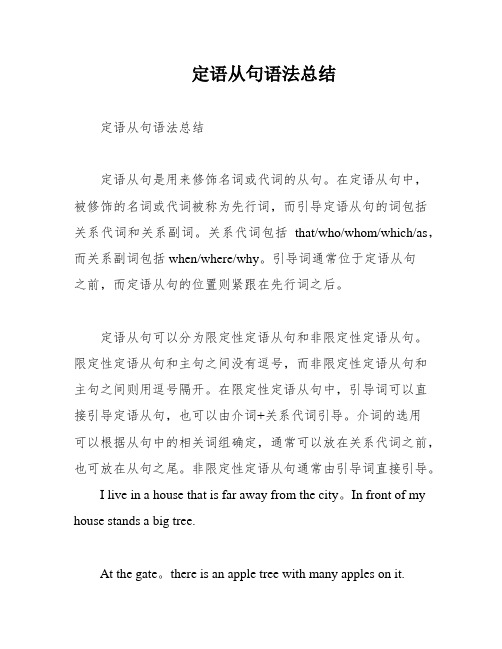
定语从句语法总结定语从句语法总结定语从句是用来修饰名词或代词的从句。
在定语从句中,被修饰的名词或代词被称为先行词,而引导定语从句的词包括关系代词和关系副词。
关系代词包括that/who/whom/which/as,而关系副词包括when/where/why。
引导词通常位于定语从句之前,而定语从句的位置则紧跟在先行词之后。
定语从句可以分为限定性定语从句和非限定性定语从句。
限定性定语从句和主句之间没有逗号,而非限定性定语从句和主句之间则用逗号隔开。
在限定性定语从句中,引导词可以直接引导定语从句,也可以由介词+关系代词引导。
介词的选用可以根据从句中的相关词组确定,通常可以放在关系代词之前,也可放在从句之尾。
非限定性定语从句通常由引导词直接引导。
I live in a house that is far away from the city。
In front of my house stands a big tree.At the gate。
there is an apple tree with many apples on it.This is the man to whom I gave the book.He has five children。
two of whom are living abroad.We have three books。
none of which are interesting.Non-restrictive relative clauses can be introduced by any relative pronoun except for "why" and "that"。
They are set off by commas and provide nal n about the antecedent。
They can be translated as two separate sentences.The engineer。
定语从句引导词的选择与语法规则解析
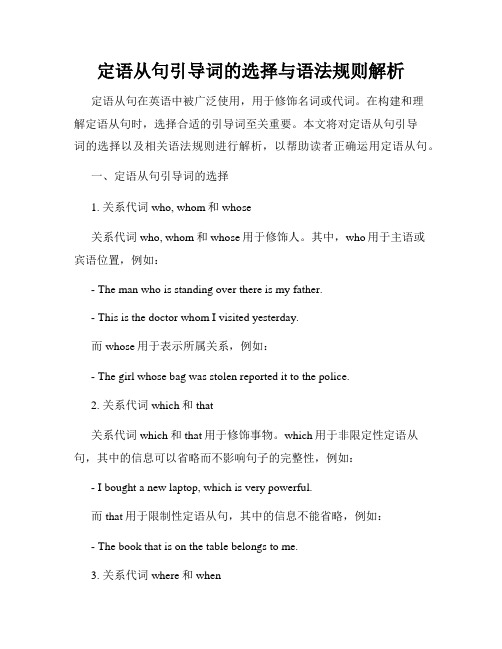
定语从句引导词的选择与语法规则解析定语从句在英语中被广泛使用,用于修饰名词或代词。
在构建和理解定语从句时,选择合适的引导词至关重要。
本文将对定语从句引导词的选择以及相关语法规则进行解析,以帮助读者正确运用定语从句。
一、定语从句引导词的选择1. 关系代词who, whom和whose关系代词who, whom和whose用于修饰人。
其中,who用于主语或宾语位置,例如:- The man who is standing over there is my father.- This is the doctor whom I visited yesterday.而whose用于表示所属关系,例如:- The girl whose bag was stolen reported it to the police.2. 关系代词which和that关系代词which和that用于修饰事物。
which用于非限定性定语从句,其中的信息可以省略而不影响句子的完整性,例如:- I bought a new laptop, which is very powerful.而that用于限制性定语从句,其中的信息不能省略,例如:- The book that is on the table belongs to me.3. 关系代词where和when关系代词where用于修饰地点,when用于修饰时间,例如:- I still remember the city where I was born.- I will never forget the day when we met.4. 关系副词why关系副词why用于修饰原因,通常出现在一个由表示原因的名词、动词或形容词引导的从句中,例如:- I don't know the reason why he quit his job.二、定语从句的语法规则解析1. 非限制性定语从句非限制性定语从句用于为前面提到的名词或代词提供额外的信息,不限制或限定其范围。
定语从句的语法

定语从句的语法定语从句的语法大全一、定语从句的概念在复合句中,修饰某一名词或代词的从句叫定语从句。
被修饰的名词或代词叫先行词,定语从句一般放在先行词的后面。
二、定语从句的关系词引导定语从句的关系词有关系代词和关系副词,常见的关系代词包括that, which, who(宾格whom,所有格whose)等,关系副词包括where, when, why等。
关系代词和关系副词放在先行词及定语从句之间起连接作用,同时又作定语从句的重要成分。
三、定语从句的分类根据定语从句与先行词的关系,定语从句可分为限制性定语从句及非限制性定语从句。
限制性定语从句紧跟先行词,主句与从句不用逗号分开,从句不可省去,非限制性定语从句主句与从句之间有逗号分开,起补充说明作用,如省去,意思仍完整。
四、关系代词的用法1.that 既可以用于指人,也可以用于指物。
在从句中作主语或宾语,作主语时不可省略,作宾语可省略。
例如:Mary likes music that is quiet and gentle. 玛丽喜欢轻柔的`音乐。
(that作主语)The coat (that) I put on the desk is blue. 我放在桌子上的那件外套是蓝色的。
(that作宾语)2.which用于指物,在句中作主语或宾语,作主语不可省略,作宾语可省略。
例如:The building which stands near the train station is a supermarket. 位于火车站附近的那座大楼是一家超市。
(作主语)The film (which) we saw last night was wonderful. 我们昨天晚上看的那部电影很好看。
(作宾语)3.who, whom用于指人,who用作主语,whom用作宾语。
在口语中,有时可用who代替whom,也可省略。
例如:The girl who often helps me with my English is from England.经常在英语方面帮助我的那个女孩是英国人。
定语从句的用法及注意事项
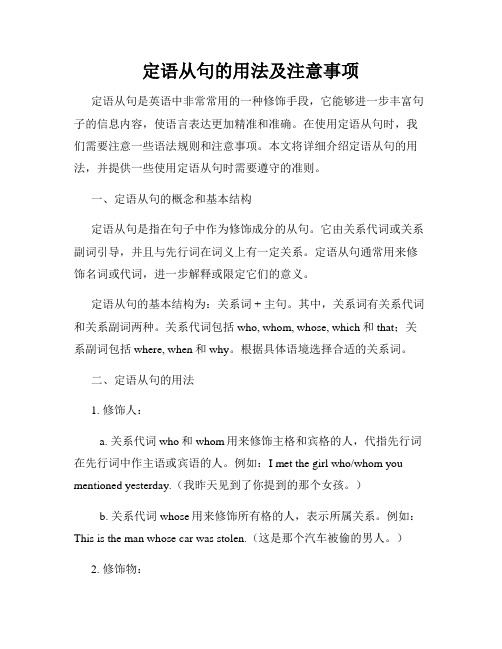
定语从句的用法及注意事项定语从句是英语中非常常用的一种修饰手段,它能够进一步丰富句子的信息内容,使语言表达更加精准和准确。
在使用定语从句时,我们需要注意一些语法规则和注意事项。
本文将详细介绍定语从句的用法,并提供一些使用定语从句时需要遵守的准则。
一、定语从句的概念和基本结构定语从句是指在句子中作为修饰成分的从句。
它由关系代词或关系副词引导,并且与先行词在词义上有一定关系。
定语从句通常用来修饰名词或代词,进一步解释或限定它们的意义。
定语从句的基本结构为:关系词 + 主句。
其中,关系词有关系代词和关系副词两种。
关系代词包括who, whom, whose, which和that;关系副词包括where, when和why。
根据具体语境选择合适的关系词。
二、定语从句的用法1. 修饰人:a. 关系代词who和whom用来修饰主格和宾格的人,代指先行词在先行词中作主语或宾语的人。
例如:I met the girl who/whom you mentioned yesterday.(我昨天见到了你提到的那个女孩。
)b. 关系代词whose用来修饰所有格的人,表示所属关系。
例如:This is the man whose car was stolen.(这是那个汽车被偷的男人。
)2. 修饰物:a. 关系代词which用来修饰主格和宾格的物,代指先行词在先行词中作主语或宾语的物。
例如:I bought a book which/that is very interesting.(我买了一本非常有趣的书。
)b. 关系代词whose用来修饰所有格的物,表示所属关系。
例如:This is the house whose roof was damaged.(这是那栋屋顶受损的房子。
)3. 修饰地点、时间、原因:a. 关系副词where用来修饰地点,指代先行词在先行词中表示地点的名词。
例如:Do you know the place where we met?(你知道我们见面的地方吗?)b. 关系副词when用来修饰时间,指代先行词在先行词中表示时间的名词。
定语从句语法总结

定语从句语法总结定语从句是英语语法中一个重要的部分,它用来限定或修饰名词或代词,并且在句子中起到修饰的作用。
掌握定语从句的使用方法和语法规则对于我们的英语学习和交流非常重要。
在下面的文章中,我将对定语从句的语法进行总结和解释。
一、定语从句的定义和作用:定语从句是一个从句,用来修饰主句中的名词或代词。
它可以提供更多的信息,限定名词或代词的范围,并且起到修饰、说明或描写的作用。
例如:The book that is on the table is mine.(那本在桌子上的书是我的。
)在这个例句中,定语从句“that is on the table”修饰主句中的名词“book”,提供更多的信息“在桌子上的”。
二、定语从句的引导词:常用的定语从句引导词有关系代词和关系副词。
1. 关系代词(relative pronouns): who, whom, whose, which, that。
关系代词的用法如下:- who:指代人,在定语从句中做主语。
- whom:指代人,在定语从句中做宾语。
- whose:指代人或物,在定语从句中表示所有关系。
- which:指代物,在定语从句中做主语、宾语或定语。
- that:指代人或物,在定语从句中可以做主语、宾语或定语。
例如:- The girl who is standing over there is my sister.(站在那边的女孩是我妹妹。
)- This is the book that I borrowed from the library.(这是我从图书馆借来的书。
)2. 关系副词(relative adverbs):when, where, why。
关系副词的用法如下:- when:在定语从句中表示时间。
- where:在定语从句中表示地点。
- why:在定语从句中表示原因。
例如:- This is the school where I used to study.(这是我过去读过的学校。
定语从句的用法

定语从句的用法定语从句是英语中一种常见的语法结构,用来修饰名词或代词。
它通过引导词(关系代词或关系副词)与主句相连,起到限定和具体化名词或代词的作用。
在本文中,我们将深入探讨定语从句的使用方法,以及一些值得注意的细节。
一、引导词的选择1. 关系代词:关系代词主要有“that”、“which”、“who”、“whom”、“whose”等。
选择哪个关系代词要根据所修饰的先行词和在从句中所起的作用来决定。
一般来说,关系代词“that”可以修饰人或物,而“which”只能修饰物;关系代词“who”和“whom”只能修饰人,分别作主语和宾语;关系代词“whose”用来指代所修饰名词的所有格。
2. 关系副词:关系副词主要有“where”、“when”、“why”等。
它们用来引导定语从句,修饰在主句中的名词或代词,并指出时间、地点或原因。
关系副词的使用具有一定的局限性,需要根据具体的情况进行选择。
二、定语从句的位置定语从句通常紧跟在被修饰的名词或代词后面。
例如:1. The book that I borrowed from the library is very interesting.(我从图书馆借来的那本书非常有趣。
)2. The person whom we met yesterday is my uncle.(我们昨天见到的那个人是我的叔叔。
)但是,当被修饰的名词或代词是主句的主语时,定语从句需要放在主句之后。
例如:1. My brother, who is a doctor, lives in London.(我的兄弟是一名医生,他住在伦敦。
)2. The movie, which was directed by Steven Spielberg, won several awards.(这部电影是由史蒂文·斯皮尔伯格导演的,它赢得了几个奖项。
)三、定语从句的省略当定语从句中缺少主语或宾语时,可以通过省略关系代词或关系副词来简化句子。
定语从句引导词的选择与语法规则

定语从句引导词的选择与语法规则定语从句是英语语法中重要的一部分,用于对名词或代词进行修饰,进一步描述或限定其具体意义,并且起到使句子更加精确和丰富的作用。
在定语从句中,选择适当的引导词以及遵循相应的语法规则至关重要。
本文将从定语从句引导词的选择和语法规则两个方面进行讨论。
一、定语从句引导词的选择1. 关系代词:关系代词包括that、which、who、whom、whose、as等。
它们根据在定语从句中担当的成分和先行词所表示的意义来选择。
- that常用于修饰无生命的事物,可以替代先行词作主语、宾语、表语等。
- which常用于修饰无生命的事物,可以替代先行词作主语、宾语、表语等。
- who常用于修饰有生命的人,可以替代先行词作主语。
- whom常用于修饰有生命的人,可以替代先行词作宾语。
- whose用于修饰无生命和有生命的人,可以表示所属关系。
- as用于修饰整个句子,常用来表示“正如”、“正像”等含义。
2. 关系副词:关系副词包括where、when、why。
它们分别表示地点、时间和原因,在定语从句中起状语的作用。
- where用于修饰地点,在定语从句中充当地点状语。
- when用于修饰时间,在定语从句中充当时间状语。
- why用于修饰原因,常用于定语从句中作原因状语。
二、定语从句的语法规则1. 关系代词在定语从句中担当的角色和成分要与先行词的成分一致。
- He is the man whom I met yesterday.(主语)- The book that you borrowed is on my desk.(宾语)- This is the house which/that belongs to Peter.(表语)2. 当关系代词在定语从句中作宾语时,可以省略。
- He is the man (whom) I met yesterday.3. 当关系代词在定语从句中作主语时,不可省略。
定语从句语法归纳总结

定语从句语法归纳总结
定语从句是用来修饰一个名词或代词的从句。
一般来说,定语从句在句子中充当形容词的角色,对先行词进行进一步的描述或限定。
定语从句的引导词主要有以下几种:
1. 关系代词:who, whom, whose, which, that;
2. 关系副词:where, when, why。
定语从句的一般句型为:
先行词+关系代词/关系副词+句子主干
定语从句的位置可以是先行词的后面,也可以是先行词的前面。
如果是将定语从句放在先行词后面,需要使用逗号将两者分隔开。
如果是将定语从句放在先行词前面,不需要使用逗号。
关系代词的用法:
1. who: 指人,作主语或宾语;
2. whom: 指人,作宾语;
3. whose: 指人或物,表示所有关系;
4. which: 指物,作主语或宾语;
5. that: 指人或物,作主语或宾语,用于限定性定语从句。
关系副词的用法:
1. where: 指地点,用于限定性定语从句;
2. when: 指时间,用于限定性定语从句;
3. why: 指原因,用于限定性定语从句。
不同引导词的选择要根据先行词的性质和在定语从句中的所起的作用来决定。
除了基本的定语从句结构外,还有一些特殊的定语从句结构,如限制性定语从句中的省略、非限制性定语从句的用法等。
定语从句在英语中是非常常用的一种句型,掌握好定语从句的用法可以提高句子的表达能力,并且帮助我们更准确地描述和限定名词或代词。
定语从句的用法归纳
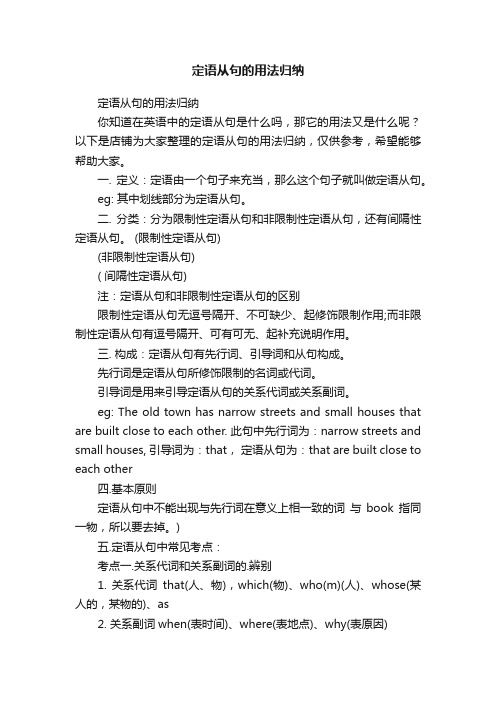
定语从句的用法归纳定语从句的用法归纳你知道在英语中的定语从句是什么吗,那它的用法又是什么呢?以下是店铺为大家整理的定语从句的用法归纳,仅供参考,希望能够帮助大家。
一. 定义:定语由一个句子来充当,那么这个句子就叫做定语从句。
eg: 其中划线部分为定语从句。
二. 分类:分为限制性定语从句和非限制性定语从句,还有间隔性定语从句。
(限制性定语从句)(非限制性定语从句)( 间隔性定语从句)注:定语从句和非限制性定语从句的区别限制性定语从句无逗号隔开、不可缺少、起修饰限制作用;而非限制性定语从句有逗号隔开、可有可无、起补充说明作用。
三. 构成:定语从句有先行词、引导词和从句构成。
先行词是定语从句所修饰限制的名词或代词。
引导词是用来引导定语从句的关系代词或关系副词。
eg: The old town has narrow streets and small houses that are built close to each other. 此句中先行词为:narrow streets and small houses, 引导词为:that,定语从句为:that are built close to each other四.基本原则定语从句中不能出现与先行词在意义上相一致的词与book指同一物,所以要去掉。
)五.定语从句中常见考点:考点一.关系代词和关系副词的.辨别1. 关系代词that(人、物),which(物)、who(m)(人)、whose(某人的,某物的)、as2. 关系副词when(表时间)、where(表地点)、why(表原因)注:关系副词可变为“介词+关系代词”结构(即:关系副词=介词+关系代词)。
eg:This is the mountain village where(=in which)I stayed last month.3. 怎样选择正确的关系代词或关系副词方法一:找出先行词和定语从句中动词,看定从中动词与先行词能否构成习惯搭配。
定语从句语法总结
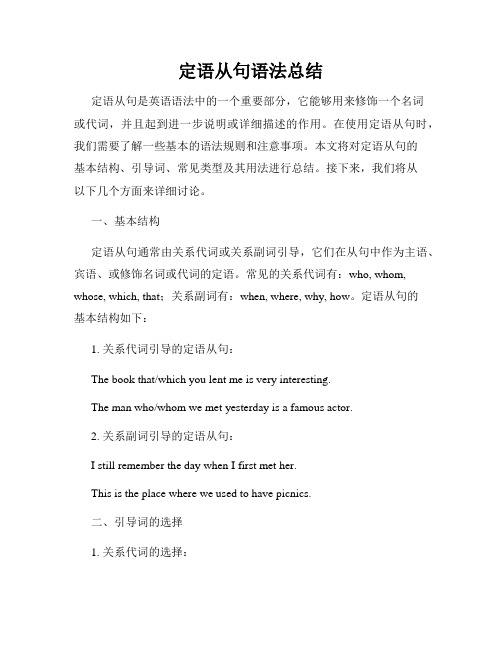
定语从句语法总结定语从句是英语语法中的一个重要部分,它能够用来修饰一个名词或代词,并且起到进一步说明或详细描述的作用。
在使用定语从句时,我们需要了解一些基本的语法规则和注意事项。
本文将对定语从句的基本结构、引导词、常见类型及其用法进行总结。
接下来,我们将从以下几个方面来详细讨论。
一、基本结构定语从句通常由关系代词或关系副词引导,它们在从句中作为主语、宾语、或修饰名词或代词的定语。
常见的关系代词有:who, whom, whose, which, that;关系副词有:when, where, why, how。
定语从句的基本结构如下:1. 关系代词引导的定语从句:The book that/which you lent me is very interesting.The man who/whom we met yesterday is a famous actor.2. 关系副词引导的定语从句:I still remember the day when I first met her.This is the place where we used to have picnics.二、引导词的选择1. 关系代词的选择:a. 当先行词是人时, 用who/whom/whose。
b. 当先行词是动物或事物时, 用which/whose。
c. 当先行词既指人又指物时, 可用that/which/whose。
2. 关系副词的选择:a. when 引导时间地点,在从句中作状语。
b. where 引导地点,在从句中作状语。
c. why 引导原因或理由,在从句中作状语。
d. how 引导方式、程度或比较,在从句中作状语。
三、定语从句的类型及使用1. 限定性定语从句限定性定语从句用于对先行词起修饰或限制的作用,它提供的信息对于句子来说是必要的,如果去掉定语从句,主句的意思就不完整或不明确。
关系代词可以作为主语、宾语、或修饰名词的定语。
定语从句语法

定语从句定语是指在句子中用来修饰名词、代词的成分如:I will give my teacher a bunch of beautiful flower. (中beautiful就是定语)定语从句是指在一个句子中作定语的句子,定语从句要放在所修饰的词后如:I have met the doctor who is in the No.1 hospital.定语从句的连接词:连接代词:who、which、whom、whose、that连接副词:when、where、why一.定语从句的功用和结构在复合句中,修饰某一名词或代词的从句叫做定语从句。
被定从句修饰的词叫做先行词。
定语从句必须放在先行词之后。
引导定语从句的关联词有关系代词和关系副词。
例如:This is the present that he gave me for my birthday. Do you know everybody who came to the party?I still remember the night when I first came to the village? This is the place where Chairman Mao once lived.关系代词和关系副词的功用关系代词和关系副词用来引导定于从句,在先行词和定语从句之间起纽带作用,使二者联系起来。
关系代词和关系副词又在定语从句中充当一个成分。
关系待客做主语,宾语,定语,关系副词可作状语。
作主语:关系代词在定语从句中作主语时,从句的谓语动词的人称和数须和先行词一致。
例如:I don’t like people who talk much but do little. The cars which are produced in Hubei Province sell very well.2. 作宾语:She is the person that I met at the school gate yesterday. The book that my grandmother gave me is called “The Great Escape”.3. 作定语关系代词whose在定语从句中作定语用。
定语从句三原则

定语从句三原则定语从句是英语语法中的一种重要句型,它可以用来修饰名词或代词,使动词后面的主语、宾语或其他成分更加具体和明确。
在英语中,定语从句的构成相对简单,但其应用还是需要遵循一定的规则,本文将介绍定语从句的三个原则,并为读者提供相关的例子和实用技巧。
一、关系词的选择关系词是定语从句中的核心,它能够连接主句和从句,表示它们之间的关系。
常用的关系词有:that、which、who、whose、whom、when和where等。
选择哪个关系词要看两个方面:首先,要看关系词所连接的先行词是人还是事物,是单数还是复数,是主语还是宾语等;其次,要看关系词在从句中所起的作用,是主语、宾语还是表语等。
关于选择关系词,有以下几个原则:1.人:who或that例如:The girl who is wearing a red dress is my sister.那个穿着红色连衣裙的女孩是我的妹妹。
The teacher that I met yesterday is very kind.我昨天遇见的那位老师非常友好。
2.事物:which、that或不用关系词例如:The book which/that I borrowed from the library is very interesting.我从图书馆借来的书很有趣。
The pen that I lost yesterday was blue.昨天我丢的那枝钢笔是蓝色的。
Tom has a bike and a car. The bike is new.汤姆有一辆自行车和一辆汽车,这辆自行车是新的。
3.所有格:whoseThe girl whose bag was stolen was crying.那个被偷了包的女孩正在哭泣。
4.宾语(人或物):whom或that例如:The woman whom/that I saw yesterday is a doctor. 我昨天看见的那个女人是一名医生。
定语从句的语法规则

定语从句的语法规则1. 定语从句一定要有先行词呀!就像有个人得先站在那,后面才能跟着说关于他的事儿。
比如说,“The man who is wearing a blue shirt is my father.”(那个穿着蓝色衬衫的男人是我爸爸),这里的“man”就是先行词。
2. 关系代词或关系副词可不能乱选哦!得根据先行词在从句中的作用来定。
比如“ The place where I met her is very special.”(我遇见她的那个地方很特别),这里用“where”是因为先行词“place”在从句中作地点状语。
3. 关系代词作宾语的时候可以省略呀!哎呀,比如“He is the person (whom) I gave the book.”(他就是我给书的那个人),这里的“whom”就可以省略呢。
4. 定语从句的时态要注意和主句协调呀!可不能乱套。
像“This is the book that I bought yesterday, and now I am reading it.”(这就是我昨天买的那本书,现在我正在读呢),时态就很合适。
5. 先行词是人用关系代词“who”“whom”“that”,这可得记住了呀!好比说“ The girl who is singing is very beautiful.” (那个正在唱歌的女孩非常漂亮)。
6. 先行词是物用关系代词“which”“that” 呀!就像“ The book which I like is on the shelf.”(我喜欢的那本书在架子上)。
7. 定语从句还能修饰整个句子呢!神奇吧!比如说“He came late, which made his teacher angry.” (他来晚了,这使得他的老师很生气)。
我的观点结论就是:定语从句虽然规则不少,但只要掌握好这些,就能运用自如啦!。
定语从句语法总结
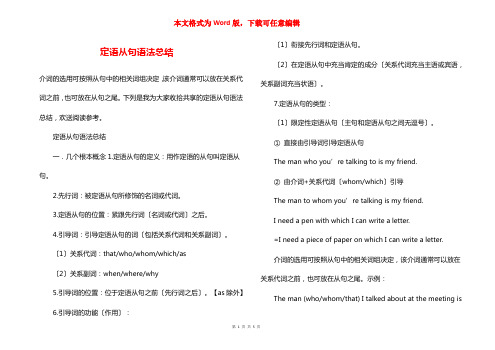
定语从句语法总结介词的选用可按照从句中的相关词组决定,该介词通常可以放在关系代词之前,也可放在从句之尾。
下列是我为大家收拾共享的定语从句语法总结,欢送阅读参考。
定语从句语法总结一.几个根本概念1.定语从句的定义:用作定语的从句叫定语从句。
2.先行词:被定语从句所修饰的名词或代词。
3.定语从句的位置:紧跟先行词〔名词或代词〕之后。
4.引导词:引导定语从句的词〔包括关系代词和关系副词〕。
〔1〕关系代词:that/who/whom/which/as〔2〕关系副词:when/where/why5.引导词的位置:位于定语从句之前〔先行词之后〕。
【as除外】6.引导词的功能〔作用〕:〔1〕衔接先行词和定语从句。
〔2〕在定语从句中充当肯定的成分〔关系代词充当主语或宾语,关系副词充当状语〕。
7.定语从句的类型:〔1〕限定性定语从句〔主句和定语从句之间无逗号〕。
①直接由引导词引导定语从句The man who you’re talking to is my friend.②由介词+关系代词〔whom/which〕引导The man to whom you’re talking is my friend.I need a pen with which I can write a letter.=I need a piece of paper on which I can write a letter.介词的选用可按照从句中的相关词组决定,该介词通常可以放在关系代词之前,也可放在从句之尾。
示例:The man (who/whom/that) I talked about at the meeting isfrom Beijing University.=The man about whom I talked at the meeting is from Beijing University.The palace (which/that) I often pay a visit to was built in the 17th century.=The palace to which I often pay a visit was built in the 17th century.〔2〕非限定性定语从句〔主句和定语从句之间用逗号隔开〕。
- 1、下载文档前请自行甄别文档内容的完整性,平台不提供额外的编辑、内容补充、找答案等附加服务。
- 2、"仅部分预览"的文档,不可在线预览部分如存在完整性等问题,可反馈申请退款(可完整预览的文档不适用该条件!)。
- 3、如文档侵犯您的权益,请联系客服反馈,我们会尽快为您处理(人工客服工作时间:9:00-18:30)。
定语可以由形容词、代词、数词、名词、分词、不定式、介词短语等来担任,修饰名词。
(以分词、介词短语为例)
例:The girl behind the tree is Kate.
The man driving too fast was a drunk.
定语从句
在英语中,修饰名词或代词的句子叫定语从句。
例:The girl who is behind the tree is Kate.
The man who was driving too fast was a drunk.
关系词判断步骤:
首先,要辨别出先行词。
如果先行词是指人,关系词可能就用
who, that, whom ,whose。
如果先行词指物,关系词可能用which或that
1.which指物,做主语或宾语(作宾语可省略, 如介词提前则不能省)
2.who指人,做主语或宾语(作宾语可省略)
3.whom指人,作宾语(作宾语可省略,如介词提前则不能省)
4.关系代词that 指人/物,做主语或宾语(作宾语可省略)
有些情况下只用关系词that,而不宜用which
1.从句所修饰的词又被形容词最高级或序数词修饰时,只能用that引导从句.
This is the most interesting story ( that )I have ever heard.
The first meeting ( that) we will take part in will be held in the afternoon.
2.先行词是all, something, nothing, anything不定代词时,只能用that.
▪Here is something ( that) I will tell you.
▪Not all that glitters is gold.
3.先行词既有人也有物时,只能用that引出从句
▪I can remember well the persons and some pictures(that) I see.
4.先行词是one of, the one, 或用little ,few, no, all ,any 作修饰,用that
▪Is it the one that you want ?
▪We haven’t got much that we can offer you.
5.当主句已有疑问词who或which时,关系词用that
▪Which is the bike that you lost?
▪Who is the woman that was praised at the meeting?
❖从例句中看出,who、that在许多情况下可以通用,但有时宜用
用who,而不用that
1.先行词是one(s) ,anyone, someone, those时,关系词使用who
▪Those who want to go to the Great Wall sign up here.
▪One who has nothing to fear oneself dares to tell the truth.
2.在there be 句型中,先行词指人,关系词用who
▪There is an old man who wants to see you.
▪There are many young men who are against him.
关系副词是用来引导定语从句的,它和关系代词一样,具有3种作用。
在从句中代替先行词。
在句中作状语连接作用,把两个句子连接成为一个带有定语从句的复合句
关系副词有三种:
where:在从句中作地点状语,指代地点. ( on in/at…which)=that when: 在从句中作时间状语,指代时间。
(on / in…which)=that why: 在从句中作原因状语,指代原因=that
关系副词的用法:
1.where 的用法:(先行词应是地点名词)
The hotel wasn’t clean. + We stayed at the hotel
=The hotel where we stayed wasn’t clean
=The hotel at which we stayed wasn’t clean.
=The hotel which we stayed at wasn’t clean
=The hotel 关系词略we stayed at wasn’t clean
2.when的用法:(先行词应是表示时间的名词)
I’ll never forget the day. + I joined the League on that day.
I’ll never forget the day that I joined the League.(口语)
I’ll never forget the day on which I joined the League .
I’ll never forget the day when I joined the League.
3.why的用法:( 表示原因的名词)
The reason why I’m calling you is to invite you to a party.
The reason that I’m calling you is to invite you to a party
The reason I’m calling you i s to invite you to a party。
